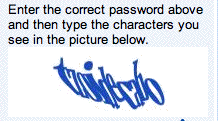Captcha Disease

I went to log in to my office Google account today and the first time through it didn’t let me in. I took a closer look at the form and realized that the odd image I’d presumably ignored was in fact a captcha that was so twisted it didn’t even register as text at first.
It used to be that captchas combined two words, making it slightly easier to figure out what the strained text was supposed to represent. My guess is that someone pointed out that this made it more difficult for people who don’t read English to decipher. And rather than making it easier for people who don’t read English, captcha-makers decided to make it more difficult for people who do.
Turns out this one was readable—it only took about ten seconds to parse out, mainly for that “d” in the center and figuring out whether the first “o” was on its own or part of something that might be a “z”. And at least Google’s captchas aren’t case sensitive (they say so in the caption) and possibly don’t contain numbers (they didn’t say so, but there weren’t any in mine). But I can’t imagine what my parents would do on that image.
Or what I’ll do in twenty years, and that’s assuming that captchas remain only as unreadable as they are today. They’re getting worse and worse every year. Soon, I’ll need computer assistance to read them…
- Inaccessibility of CAPTCHA
- “A common method of limiting access to services made available over the Web is visual verification of a bitmapped image. This presents a major problem to users who are blind, have low vision, or have a learning disability such as dyslexia. This document examines a number of potential solutions that allow systems to test for human users while preserving access by users with disabilities.”
